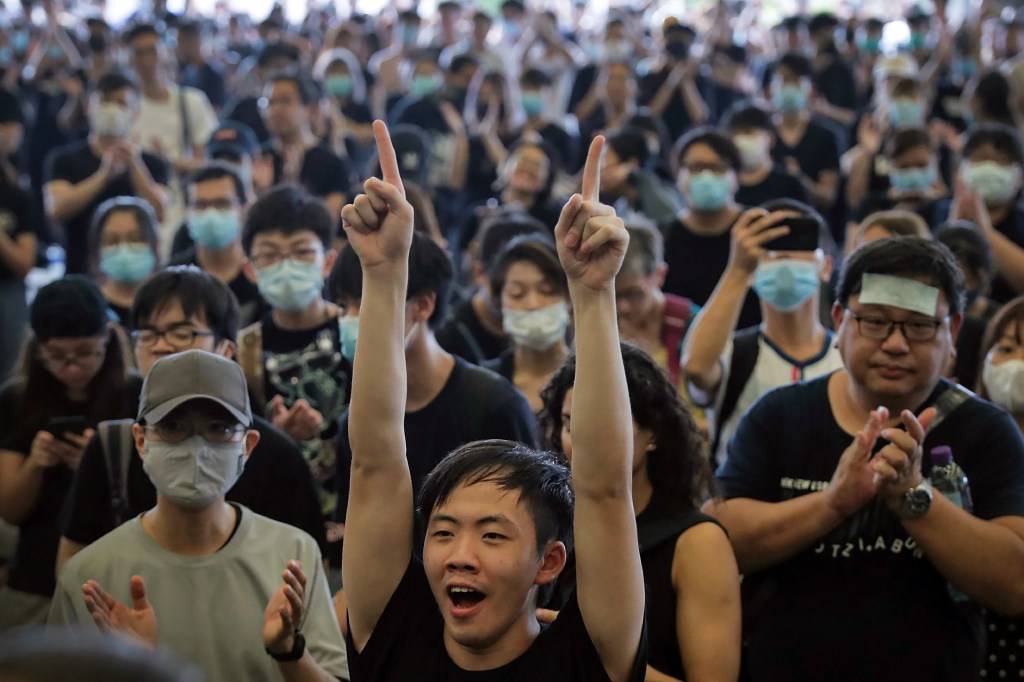Hong Kong’s leader is under pressure to step down after millions of protesters marched through the city on Sunday calling for a change in government.
Despite scrapping a controversial extradition bill and issuing an apology on Sunday evening, chief executive Carrie Lam is facing pressure to resign over her handling of the protests.
Videos by VICE
Joshua Wong, the leader of the pro-democracy Umbrella Movement, which brought the city to a standstill for 79 days in 2014, was released from prison on Monday morning and immediately added his voice to those calling for Lam’s resignation.
Mobbed by journalists as he left prison after serving one month for his part in the 2014 protests, Wong said it was his “honor and pleasure to join this movement.”
The current wave of protests began as an attempt to stop the passage of an extradition bill that would have left people in Hong Kong exposed to China’s unfair legal system. Now, they have now taken on a wider significance, with protesters seeking to oust Lam.
What happened on Sunday?
A huge crowd of protesters marched through Hong Kong island for six hours on Sunday. The organizers of the march, the Civil Human Rights Front (CHRF) said numbers topped 2 million, double the number who took part last Wednesday — but police downplayed the turnout, saying just 338,000 people attended.
Last Wednesday’s protest turned violent, and 11 people were arrested after clashes with police, who used rubber bullets and tear gas to disperse crowds. This time around, police played a much more withdrawn role of crowd control.
Many protesters wore black and held white flowers to mourn the protester who fell to his death on Saturday hours after unfurling an anti-extradition banner.
What about the extradition bill?
Late on Saturday, Lam announced that the government was indefinitely postponing the Beijing-backed bill, which critics said would allow China to crack down further on dissent by extraditing its critics on political grounds.
But Lam’s handling of the fiasco, and in particular her characterization of the protests as “riots,” has angered Hong Kong citizens. Lam issued a rare apology on Sunday night via a written statement:
“The chief executive apologized to the people of Hong Kong for this and pledged to adopt a most sincere and humble attitude to accept criticisms and make improvements in serving the public.”
But CHRF dismissed the apology, saying protests would continue until the extradition bill had been withdrawn entirely. It also demanded that the government retract the characterization of Wednesday’s protests as a “riot,” release the 11 people arrested and withdraw all charges.
Pro-democracy and pro-establishment lawmakers alike are leveling criticism at Lam.
“If she refuses to withdraw, to scrap this controversial bill altogether, it would mean that we wouldn’t retreat. She stays on. We stay on,” pro-democracy lawmaker Claudia Mo said. “Carrie Lam has lost all credibility among the Hong Kong people. She must step down.”
One pro-establishment lawmaker, speaking to the South China Morning Post, said: “Her interpretation of things on Saturday was not ideal … While she could not accept people’s calls for her to resign, she also suggested that the people were wrong. She sounded too tough.”
How has Beijing responded?
Beijing has yet to issue an official response to Sunday’s protests, but it has once again upped its censorship of online searches for anything to do with Hong Kong’s protests.
A government office issued a directive on Sunday to media organizations calling for a virtual blackout of the protests, according to China Digital Times, a California-based website that tracks Beijing’s online censorship efforts.
“All websites: Find and delete video content related to Hong Kong anti-extradition protests. Check and delete any harmful comments under Hong Kong songs such as “Broad Sky,” “Really Love You,” and “Queens Avenue East,” the directive said, referring to terms that are linked to song lyrics that Chinese citizens use as a way of circumvent Beijing’s censorship.
The size and scale of the protests are a reminder to Chinese President Xi Jinping that his authoritarian control on power does not yet extend to Hong Kong, which has repeatedly shown its willingness to stand up to Beijing’s efforts to erode the territory’s independence.
Cover: Protesters cheer as they listen to a speech by pro-democracy activist Joshua Wong near the Legislative Council in Hong Kong, Monday, June 17, 2019. Wong, a leading figure in Hong Kong’s 2014 Umbrella Movement demonstrations, was released from prison on Monday and vowed to soon join the latest round of protests. (AP Photo/Kin Cheung)




